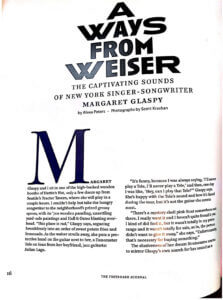
Arty’s body is bent in a fishhook, the wad of plastic bags under his head leaving wrinkles in his cheek. He is lying where the concrete wedge that slopes up from the freeway meets the overpass.
It isn’t much to come back to at night, but at least it’s his. He only had two things in the world he could call his own: his overpass and his duffle bag.
Tonight, even the throws of sleep evade his grasp. His mind is a thunderhead of traffic punctuated by memories that shock him awake. The dank night air blows through encasing him in a moist caste. He shivers, brings his knees to his chest and tucks the blue tarp, weathered to a dull gray, under him. It seems a millennium since he whispered his hopes and dreams into clasped hands, these same knees leaving half-moons in the plush rug.
There’s no use praying anymore, he thinks. No salvation follows the nights he spends huddling to the pillar of his underpass. There is no higher being that blesses his stomach with hot food. There is no miracle to patch the rips in his shoes.
He rolls over, hearing the tarp scratch against the gravel surface beneath him. The sound brings to mind a swish on the head a snare drum.
My soul is full of rainwater, he thinks.
~
Maxine watches as Robert’s hands place a carefully wrapped package under the Christmas tree.
When they first met, Maxine had liked those hands. They were the sure and nonchalant hands she could imagine ripping gold-rimmed checks from pocketbooks. She liked them even more when she imagined them signing his last name.
Watson.
The Watsons were local royalty. They were envied for their successful family law firm and for their white picket fence smiles that gated boundless charm.
Everyone wanted to be a Watson and Maxine was no exception. Her mommy always told her she needed a man who made love with his pocketbook. A man who could give her all the pretty things her daddy could never give her mommy. She thought Robert Watson was that man.
Robert’s attraction was less calculated. The second Maxine stroked the lapel of his suit in introduction, he thought of love. And sure enough, he let himself fall, even though he knew he was a sentimental schmuck who loved too easily.
Robert is still in love, or so he thinks. But when Maxine wakes up in the morning, after she washes her face and towels it dry, all she sees is the reflection of her mother’s unhappiness in the ornate mirror. That, and her lack of diamond stud earrings.
Robert, as well, notices how scorn is perpetually stained on her face. His head is a hoarder’s collection of worries but it is his failure to please Maxine that drives him out of his mind.
~
At the sound of a truck horn Arty’s eyes flash open. Through the thick mist of slumber, he realizes that he actually dreamt. He hasn’t dreamt since he lost his sax. He tries to make out every edge of the dream, like reconstructing the perfect sand castle after a wave.
The bouncing stylus of his record player.
Coltrane.
Vodka Tonics.
Abalone keys.
Smoky orange.
As he thinks harder, though, the images fade further. Waves of reality hit his shores and drag bliss back out to sea. In minutes, Arty is left only with a tightening in his stomach.
The raspy blare of Ellington from the dining room radio and the smell of his mother’s tuna casserole bathed his senses.
Napkins. Forks. Plates.
Pass the peas, please?
Pass the class, please.
“I’m going to become a musician,” Arty’s lips retorted automatically.
Silence.
The clank of a fork being set down.
The sting of his father’s prolonged sip of whiskey.
No. You’re not.
That was Arty’s last night in that house.
~
On Christmas morning, Robert is hopeful as he listens to his wife rip ravenously at her gift. As he waits, he gazes at the fake tree in the corner, gaudy with tinsel. Gifts flood the living room floor and pour onto the leather couch. Torn bits of red gift-wrapping are strewn all over like tufts of hair. The living room is a massive wad of regurgitated Christmas cheer.
The flab on Maxine’s arm jiggles, diverting Robert’s imagination from the scene in the living room to the thought of raw chicken breast and then to his mother’s delectable potpies.
Food, he thinks, she can’t object to anything that involves food!
It was that idea that persuaded Robert into purchasing Maxine’s gift. He’d spent close to four miserable hours wandering around the mall in search of Maxine’s gift and it was making him anxious. Robert had a distinct dread of everything that shopping malls entailed: bankruptcy, crowds, small spaces, the possibility of losing his car in the parking lot, public restrooms and germs in general. He was about to give up and leave when something displayed in a store window caught his attention.
Like a miracle, there it was. The prettiest Panini maker he’d ever seen. Its exterior glittered with the reflection of the white linoleum floor. He rushed inside and took the price tag in his thumb and forefinger. $500! To justify that price, he read about its customizable griddle plates and self shut-off capabilities! It was perfect, or so he thought at the time.
Maxine’s unwrapping reveals the Cuisinart label. After a few more rips, her horror reveals itself as well. She bursts off the couch and bolts out of the living room coughing with forced sobs. Robert spends a moment watching the couch recover from the impression of her backside and then follows her like an obedient puppy.
“Good gracious Robert! You got me a toaster!? That’s it!”
“But.” Robert says.
“That’s it. I can’t take this.” She forces out another theatrical hiccup, her eyes fringed with globs of mascara.
“…it’s…” he stutters.
“That’s it! You have no idea what I want!”
“…a Panini maker.”
She stomps up the stairs petulantly and slams their bedroom door.
Robert sighs and picks up a sheet of used wrapping paper. He folds it before throwing it away and then pads up the stairs. At the bedroom door he listens hard: the unmistakable tinkling of a suitcase zipper sends his heart sliding down his spine, catching painfully on every vertebra.
All of the sudden, Maxine yanks the door open, her face red and puffy like a fresh burn. Robert loses his balance and falls forward, kneeling at her feet.
“I can’t do this anymore,” she pauses, taking an exasperated breath, “I’m leaving you.”
She shoves him out of the way and starts down the stairs with three bouncing suitcases. There are a million Louis Vuitton logos stretched and distorted by the immense amount of clothing she packed.
louiSVUITton
That’s all he sees as she slams the door on that chapter of his life.
~
Arty searches the horizon for anything but the promise of rain when a semi truck roars by, breaking his trance. Arty sighs and bends his leg, greeting a cramp in his calf muscle. He massages the spot gently with one hand while reaching for his duffle with the other.
Arty never goes anywhere without his duffle. He’s had it since he left home twenty years ago. The dark green fabric is worn and soft, but it never fails to keep out the rain. Sometimes, if he’s having an especially bad day, he puts his nose to it. The scent of warm cinnamon, his mother’s favorite potpourri, is still there.
Arty unzips the duffle, revealing that last night’s dinner of canned tomatoes left a slash of red slop inside. He licks his fingers and rubs the stain gently, thinking of blood. Then he grabs the can and takes it to a puddle to rinse it out. Cans equal coins. That is the first rule in his How to be Homeless handbook. He’ll go exchange this one, but first he needs breakfast.
He slings the duffle over his shoulder and eases precariously down to the side of the road. The freeway roars next to him as he hobbles towards Exit 34. He takes the off-ramp and climbs to the intersection at the top, scatting a melody he used to play. It’s a good spot. The signal is placed perfectly. The flash of its red light forces people to stop and look. Stop and see what is usually invisible.
Arty sets down his duffle and pulls out a cardboard sign rolled long and tight like a telescope.
Homeless. Anything would be appreciated. God bless you.
(The last bit was added more out of convention than sincerity. Fuck you for ignoring me wasn’t exactly proactive begging.)
Arty hears something and then looks directly across the street.
“The corner of thunder and lightning!”
That was the greeting The Weatherman gave Arty every morning.
When Arty first discovered this intersection, he had joined The Weatherman on his curb.
Bad idea.
The Weatherman spent the whole day yelling, “THE CORNER OF THUNDER AND LIGHTNING,” his eyes like two orange cigarettes burning into Arty’s side.
Ever since then, Arty has stood on the corner diagonal from him and things have been much better. As he stands there he watches The Weatherman’s cheerful, confused face smiling for spare change. The sight always makes Arty sad. He knows The Weatherman is what he will become if he’s forced to go without music for much longer.
Arty’s stomach growls as he peers hopefully into passing cars. Pretty women in pinstriped suits talk on headsets. Toddlers point at him out of SUVs. Teenagers laugh with the radio turned up.
At 9 AM, a woman with a kind face and billowing hair rolls down her car window and extends a handful of coins. He thinks of piano keys as they glissando into his palm.
~
Robert hasn’t moved from the couch in three weeks. He hasn’t taken the stockings off the fireplace. He hasn’t cleaned up the wrapping paper. The tree looks at him like a dressed up pet.
Take this shit off me.
His body feels the same way. His tee shirt clings to him with sweat and soy sauce and ice cream dye his front in multicolored splotches.
The coffee table is covered with four empty wine bottles, dozens of crunched beer cans, and crusty dishes but all he fixates on is the ring resting on the table edge. The mess of everything floats above him, like a soul above a lifeless body.
He puts the tip of his pinky finger in the middle of the ring and makes it spin. The “R+M=Forever” inscription inside rotates in and out of view.
Damn it, what am I supposed to do with this?
The gold band is worth a fortune but he can’t fathom selling it or keeping it. Much like how he can’t fathom his life changing or staying the same.
What the hell am I going to do?
~
Arty sloshes up 4th Ave in the rain, clinging to the spare change he received. He is woozy with hunger and sopping wet when he walks into Flo’s, his favorite diner. Shirley meets him at the door and guides him to a booth.
He’s always liked Shirley. She looks at him like a person, even with his yellow teeth and shaggy hair.
“Pie and coffee, I presume?” Her pink lips curl into a smile.
“Yes, please, if it’s not too much trouble. I can pay.” He opens his dirty fingers to reveal the change. Shirley moves closer and puts a gentle hand on his shoulder.
“Arty, I keep telling you, don’t worry about it.”
He doesn’t usually let people buy him things because he doesn’t want pity. Pity is kindness’s selfish, pessimistic brother. Pity says, “I’m going to give you this piece of bread so you get out of my face with those sad eyes.” This kind of sentiment made him want to die and he met with it everyday.
Shirley is probably the only person he knows that has never shown him pity. The tone of her voice is full of genuine care whenever she speaks with him, and her smile is always cheerful. There are no selfish motives behind her kindness.
Her strong, graceful frame moves with acrobatic ease as she brings Arty a slice of key lime pie and a mug of coffee. She carries the pie so close to her body that a dollop of whipped cream sticks to her blue apron like a cloud.
“Here you go, Arty,”
“Thanks, Shirl,” Arty replies, looking up at her from the booth.
Shirley’s face is still haunted with the perfection of youth. She has supple, fresh-looking skin that holds tight to her delicate features much like silken fabric hugs a body. Only the crow’s feet around her eyes give away the imminence of her fortieth birthday.
A woman shaking an umbrella walks into the diner, letting the door bounce closed behind her. Shirley notices but doesn’t go and greet her immediately as she usually would. Instead, she puts her elbows down on the table and cradles her face as she looks at Arty. For a few seconds, their faces are mirror images. Arty suppresses an urge to touch the blue ribbon that secures her black braid.
“It’s just a matter of time,” she murmurs. Then she stands up and goes to greet the lady at the entrance.
This is their code. It’s just a matter of time. Shirley is optimistic he will get back on his feet, and she always reminds him.
It’s just a matter of time.
~
The ring is an unblinking, bloodshot eye. Robert is still having a staring contest with it. The ring always wins, but swallows of alcohol lessen the blow.
He is laying horizontally on the leather couch, his left elbow propping him up just enough to swallow. Frantically, the bulbous pink fingers on his free hand search for a bottle, any bottle with something in it. He feels a smooth glass neck between the couch cushions and pulls on it. Gin. He tips it and a single sweet drop flutters down his tongue.
That’s it?
Robert tries to take another swig but is spooked by the hollowness of the bottle. He presses his eye so close to the glass lip it creates a vacuum. When he brings the bottle away from his face, the connection bursts with a puff of air. Robert has just finished every last drop of booze in this godforsaken house and he can feel himself sobering up.
What the hell am I going to do now?
Robert moves faster than he’s moved in weeks. In seconds, he is a headless body swimming in the oak liquor cabinet, knocking empty bottles down with every stroke. Shattered glass carves tiny rivers to nowhere in the hardwood floors.
He comes up to the surface for a breath.
The booze is gone?
The booze is gone.
His body is surprised but his head isn’t.
Hurriedly, Robert runs upstairs to get dressed. He pulls sweatpants over his striped boxers and an old sweatshirt over his head. He smoothes his hair and licks the white traces of drool from the corners of his mouth. Then he runs down stairs and grabs the gold wedding band. He puts it in his sweatshirt pocket before going out the door.
It’s just a matter of time.
~
When the last drop of coffee permeates Arty’s tongue, he slides out of the Naugahyde booth. He leaves a quarter and four dimes on the checkered tablecloth. It isn’t much but he wants Shirley to have it.
When he opens the door he realizes that the rain has stopped and the sun is showing its face. The brightness of the sky and a full-stomach has him bouncing down the street now, thinking about the first time he met Shirley.
He was playing one of his regular gigs at the Jive Joint, this great club down on Roosevelt. He’d counted the band off for Billie Holiday’s “God Bless the Child” and propped his sax up to play. When the notes sounded, they’d taken on lives of their own, ricocheting off the walls and wrapping around his head in a fragrant breeze. As always, he knew every nuance, every note, and every click of the keys. Playing music was so second nature to Arty that he never felt like he was playing music; he only felt like he was the music.
Them that’s got shall get
Them that’s not shall lose
So the bible says and it still is news
Mama may have, Papa may have
But God bless the child that’s got his own
That’s got his own
As he played he surveyed the crowd. There was a heavy-set man sitting down, leaning over his knees and snapping his fingers. A couple by the stage arranged their feet in the Charleston. A sensuous-looking woman sat in the lap of a man at the bar.
Then Arty saw another face, Shirley’s.
She was the smile that accepted a dance from a short man with a mustache. Then she was the body twirling effortlessly in front of the stage, black hair fanning out and calf muscles pulsing. When the pianist took over the melody, Arty spent twelve bars watching her polka dot skirt expand like an umbrella as she flitted about.
When his set was over, he walked up to her and asked if he could buy her a drink. She smilingly accepted.
He ate a couple salty peanuts from a bowl at the bar and watched her as she told him about herself. He remembers liking how she licked her lips after every sip and interlaced her hair in her fingers subconsciously as she spoke.
That night, she told him about her dream to be a dancer. He told her about his dream to be on the radio.
But that was before his sax got stolen. Before everything went to shit.
Arty rips his mind away from these thoughts. Instead he decides to count the number of white cars pass him by. It works until he sees a familiar twist of fiery metal hanging in a pawnshop window.
A Selmer Alto Saxophone. The tag hanging from the bell has $800 scrawled on it.
What a bargain!
This thought makes him more desperate than ever. He wants that saxophone more than a home, more than a hot meal, more than life. Dejected, Arty bows his head and keeps walking towards his destination, the liquor store.
Arty doesn’t drink anymore, he vows not to spend a single dime on it, but he’s found that liquor store patrons are more genial and generous than the average passerby. Thus, it’s a regular stop of his.
He approaches the liquor store from the side, passing the stench of a garbage heap. He spies a discarded newspaper stuck to the building with wind. His cold hand peels it away and opens it to the center spread. Years of wandering the streets has turned his body into a creaky shell of what it used to be and prolonged standing only aggravates the misery for him. So, he sits cross-legged on newspapers, his sign against his knees and his eyes hopeful.
~
Robert pulls up on the emergency brake after the car finishes gliding between the two white lines. He sits there for a moment before he removes the keys from the ignition and snaps the door handle. The sun on his face is bright and gives him a headache.
Alcohol. Maxine. Alcohol.
He makes his way through the parking lot. It is dappled with sparkly metallic and paper receipts. It looks almost like a tickertape parade, but Robert feels by no means triumphant.
Alcohol. Maxine. Alcohol.
Robert hardly notices the filthy, haggard man sitting by the front door until he is standing right next to him. Robert reads the sign propped up by the man’s dirty knees: Homeless. Anything would be appreciated. God bless you. His gray green eyes bear into Robert with something he hasn’t seen in so long it is almost unrecognizable: humility.
As if struck by lightning, Robert realizes how ridiculous he has been since Maxine left. Boy, it could be a lot worse.
Robert reaches into his pocket. He opens his clasped hand and studies the treasures inside: a Heineken bottle cap, $3.25 in change, his pure gold wedding band.
Robert goes up to the homeless man.
“What’s your name?”
“Arty.”
“Well Arty, I hope this will mean as much to you as it did to me.”
For a moment, they both look silently at the gold ring pinched between Robert’s fingers and then he drops it into Arty’s palm as thoughtlessly as he’d drop a pebble into a brook. Robert spends the walk back to his car thinking about the playful blonde ringlets on his new secretary. Arty watches his back in awe, thinking of the saxophone in the pawnshop window.



